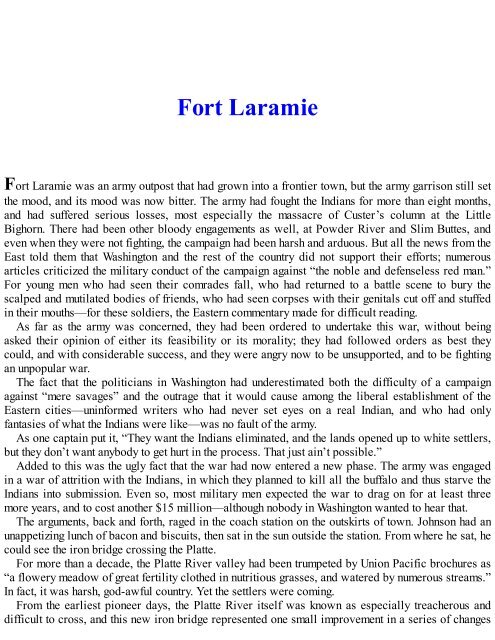Create successful ePaper yourself
Turn your PDF publications into a flip-book with our unique Google optimized e-Paper software.
Fort Laramie<br />
Fort Laramie was an army outpost that had grown into a frontier town, but the army garrison still set<br />
the mood, and its mood was now bitter. The army had fought the Indians for more than eight months,<br />
and had suffered serious losses, most especially the massacre of Custer’s column at the Little<br />
Bighorn. There had been other bloody engagements as well, at Powder River and Slim Buttes, and<br />
even when they were not fighting, the campaign had been harsh and arduous. But all the news from the<br />
East told them that Washington and the rest of the country did not support their efforts; numerous<br />
articles criticized the military conduct of the campaign against “the noble and defenseless red man.”<br />
For young men who had seen their comrades fall, who had returned to a battle scene to bury the<br />
scalped and mutilated bodies of friends, who had seen corpses with their genitals cut off and stuffed<br />
in their mouths—for these soldiers, the Eastern commentary made for difficult reading.<br />
As far as the army was concerned, they had been ordered to undertake this war, without being<br />
asked their opinion of either its feasibility or its morality; they had followed orders as best they<br />
could, and with considerable success, and they were angry now to be unsupported, and to be fighting<br />
an unpopular war.<br />
The fact that the politicians in Washington had underestimated both the difficulty of a campaign<br />
against “mere savages” and the outrage that it would cause among the liberal establishment of the<br />
Eastern cities—uninformed writers who had never set eyes on a real Indian, and who had only<br />
fantasies of what the Indians were like—was no fault of the army.<br />
As one captain put it, “They want the Indians eliminated, and the lands opened up to white settlers,<br />
but they don’t want anybody to get hurt in the process. That just ain’t possible.”<br />
Added to this was the ugly fact that the war had now entered a new phase. The army was engaged<br />
in a war of attrition with the Indians, in which they planned to kill all the buffalo and thus starve the<br />
Indians into submission. Even so, most military men expected the war to drag on for at least three<br />
more years, and to cost another $15 million—although nobody in Washington wanted to hear that.<br />
The arguments, back and forth, raged in the coach station on the outskirts of town. Johnson had an<br />
unappetizing lunch of bacon and biscuits, then sat in the sun outside the station. From where he sat, he<br />
could see the iron bridge crossing the Platte.<br />
For more than a decade, the Platte River valley had been trumpeted by Union Pacific brochures as<br />
“a flowery meadow of great fertility clothed in nutritious grasses, and watered by numerous streams.”<br />
In fact, it was harsh, god-awful country. Yet the settlers were coming.<br />
From the earliest pioneer days, the Platte River itself was known as especially treacherous and<br />
difficult to cross, and this new iron bridge represented one small improvement in a series of changes
















